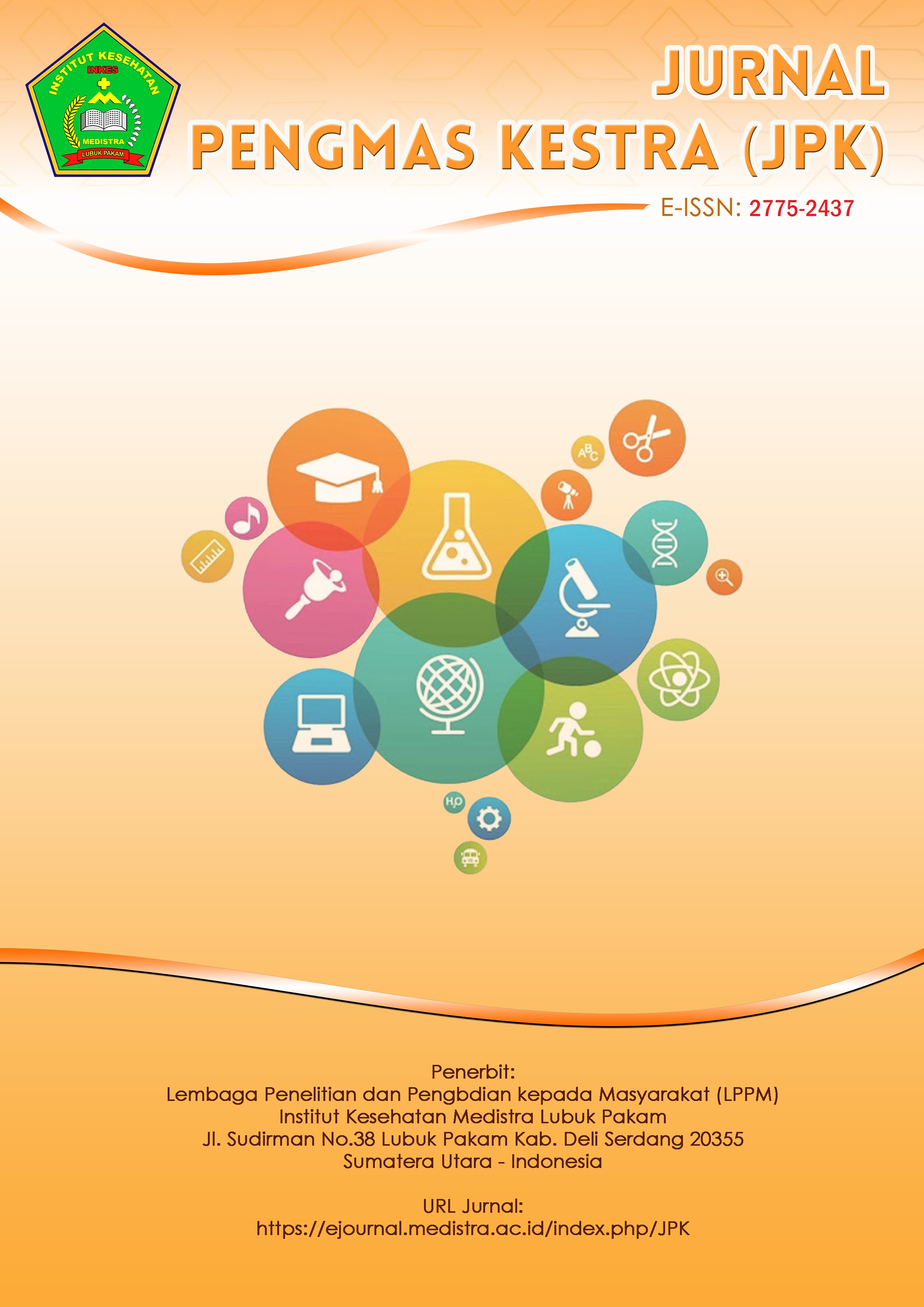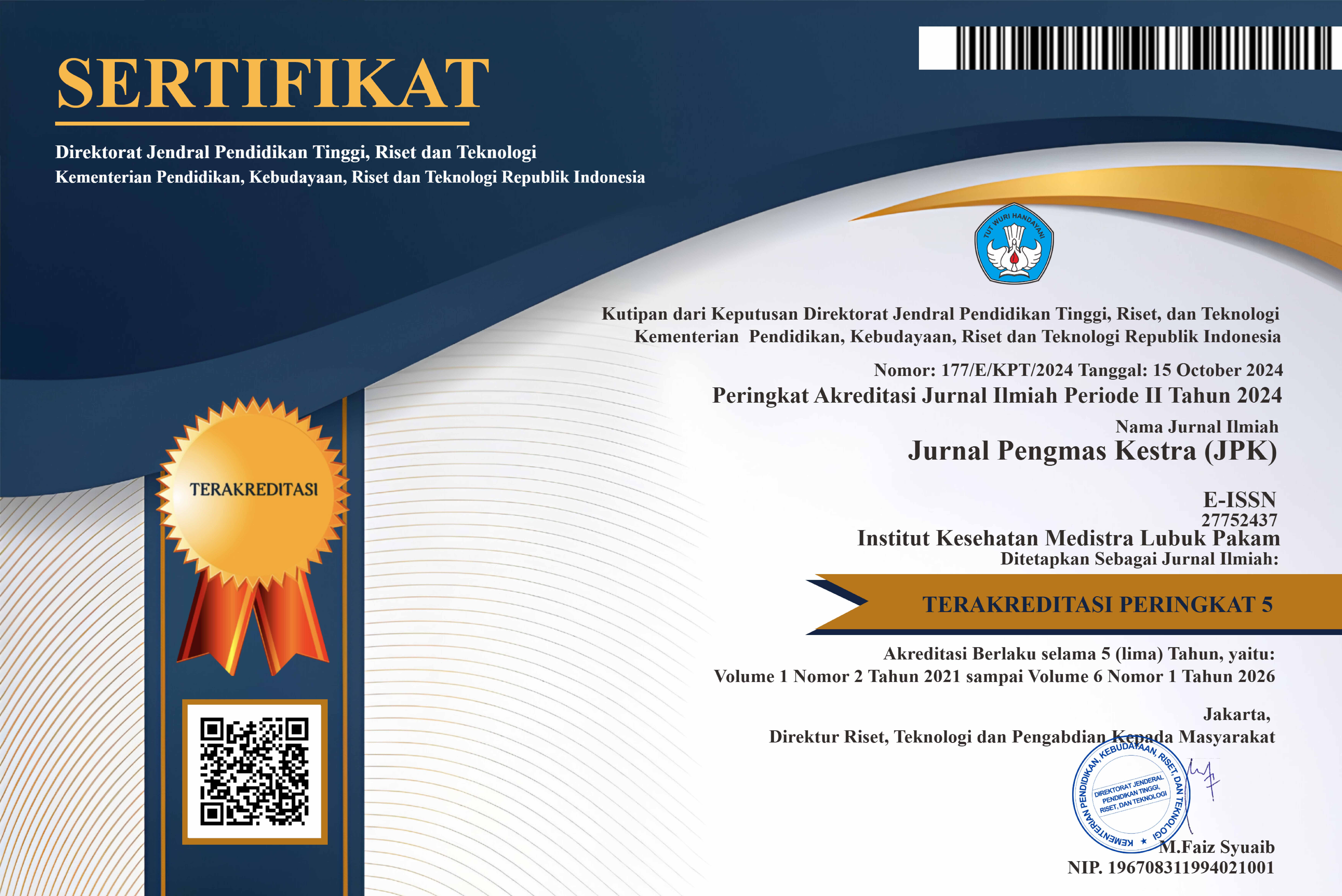Optimizing the Mother–Toddler Class to Address Wasting Through the Tangan Baliku Program Towards a Healthy and High-Quality Generation in the Working Area of Purbaratu Primary Health Center
DOI:
https://doi.org/10.35451/w0t01y29Keywords:
Child nutrition, Community empowerment, Health promotion, Maternal education, UndernutritionAbstract
Wasting in children under five remains a significant public health problem, especially in developing countries like Indonesia, where nutritional issues such as wasting, stunting, and underweight are still prevalent. This study aimed to develop and implement a community-based innovation program named Tangan Baliku (Integrated Management of Underweight Children) to address the high incidence of wasting in the working area of Purbaratu Primary Health Center. This innovation was designed and implemented in April 2022 through cross-sectoral collaboration, focusing on promotive, preventive, curative, and educational approaches. The methodology used was a descriptive participatory approach involving community empowerment through optimizing the existing mother–toddler class, home visits, nutrition counseling, supplementary feeding, and regular monitoring. The results show that Tangan Baliku effectively increases early detection and management of underweight children, improves mothers' knowledge of nutrition, and encourages higher participation in toddler health services. It also helps in reducing the number of children with poor nutritional status through structured follow-up and referral systems. In conclusion, the Tangan Baliku program is a comprehensive and sustainable strategy that addresses wasting by strengthening maternal involvement, community participation, and cross-sector collaboration in child nutrition improvement. This program contributes to better health outcomes for children under five and supports the development of a healthy and high-quality future generation.
References
[1] World Health Organization, "Global Nutrition Targets 2025: Policy Brief on Wasting," Jenewa: World
Health Organization, 2024.
[2] Kementerian Kesehatan RI, "Survei Kesehatan Indonesia 2023," Jakarta: Kementerian Kesehatan RI, 2023.
[3] UNICEF, "Strategi Global untuk Pencegahan dan Penanggulangan Wasting pada Balita," New York:
UNICEF, 2023.
[4] Puskesmas Purbaratu, "Laporan Tahunan Puskesmas Purbaratu Tahun 2023," Kota Tasikmalaya: Puskesmas
Purbaratu, 2024.
[5] P. R. Alamsyah, Ed., "Gizi dan Kesehatan Masyarakat," Sada Kurnia Pustaka, 2024.
[6] S. Martuti, "Dampak Kekurangan Gizi pada Balita," Jurnal Kesehatan Masyarakat, vol. 15, no. 2, pp. 123
130, 2024.
[7] A. Hidayat dan E. Nurhayati, "Efektivitas Kelas Ibu Balita dalam Meningkatkan Pengetahuan dan Perilaku
Gizi Ibu," Jurnal Gizi dan Kesehatan Masyarakat, vol. 15, no. 1, pp. 34-42, 2024.
[8] I. P. Sari, dkk., "Pengaruh Pendampingan Gizi terhadap Status Gizi Balita Kurus," Jurnal Gizi dan
Kesehatan Masyarakat, vol. 15, no. 3, pp. 56-64, 2024.
[9] A. M. Sirait, dkk., "Peran Lintas Sektor dalam Penanggulangan Masalah Gizi di Masyarakat," Jurnal
Kesehatan Masyarakat Indonesia, vol. 18, no. 2, pp. 123-130, 2023.
[10] D. Hastuti, dkk., "Analisis Faktor yang Mempengaruhi Kejadian Wasting pada Balita di Indonesia," Jurnal
Gizi dan Kesehatan Masyarakat, vol. 14, no. 2, pp. 45-53, 2023.
[11] S. Prasetyo, dkk., "Efektivitas Program Edukasi Gizi dalam Meningkatkan Pengetahuan dan Perilaku Ibu
Balita," Jurnal Kesehatan Masyarakat Indonesia, vol. 17, no. 1, pp. 12-20, 2022.
[12] Soekirman, "Gizi dan Kesehatan Masyarakat: Tantangan dan Peluang," Jurnal Gizi dan Kesehatan
Masyarakat, vol. 12, no. 1, pp. 1-10, 2023.
[13] S. Martuti, "Peran Lintas Sektor dalam Penanggulangan Masalah Gizi pada Balita," Jurnal Kesehatan
Masyarakat, vol. 14, no. 3, pp. 123-130, 2023.
[14] I. Holid dan E. D. Sihaloho, "Analisis Faktor-Faktor yang Mempengaruhi Kasus Gizi Buruk pada Balita di
Provinsi Jawa Barat: Studi Kasus Tahun 2012," Jurnal ISE ISEI Economic Review, vol. 1, no. 1, pp. 5-12,
2017.
[15] M. Septikasari, "Status Gizi Anak dan Faktor yang Mempengaruhi," Yogyakarta: UNY Press, 2018.
[16] K. Prawesti, "Faktor-faktor yang Mempengaruhi Wasting pada Balita Usia 6-59 Bulan di Wilayah Kerja
Puskesmas Piyungan," 2018.
[17] C. Ni'mah dan L. Muniroh, "Hubungan Tingkat Pendidikan, Pengetahuan, dan Pola Asuh Ibu dengan
Wasting dan Stunting pada Balita," Jurnal Media Gizi Indonesia, vol. 10, no. 1, 2015.
[18] M. Goi, "Gizi Bayi," Jurnal Health and Sport, vol. 7, no. 1, 2013.
[19] Nency Y. dan Arifin MT, "Gizi Buruk, Ancaman Generasi yang Hilang," Inovasi, vol. 5, no. XVII, 2015.
[20] H. Subekti, "Pola Asuh Orang Tua terhadap Status Gizi Anak," 2016.
Downloads
Published
Issue
Section
License
Copyright (c) 2025 Fiyola Ladyvia, Ismah Khaerunisa, Maulinda Nur Amalina Leandra, Rosmawaty Irma Suryani Siagian, Yatini Yatini

This work is licensed under a Creative Commons Attribution 4.0 International License.
Copyright in each article is the property of the Author.




















